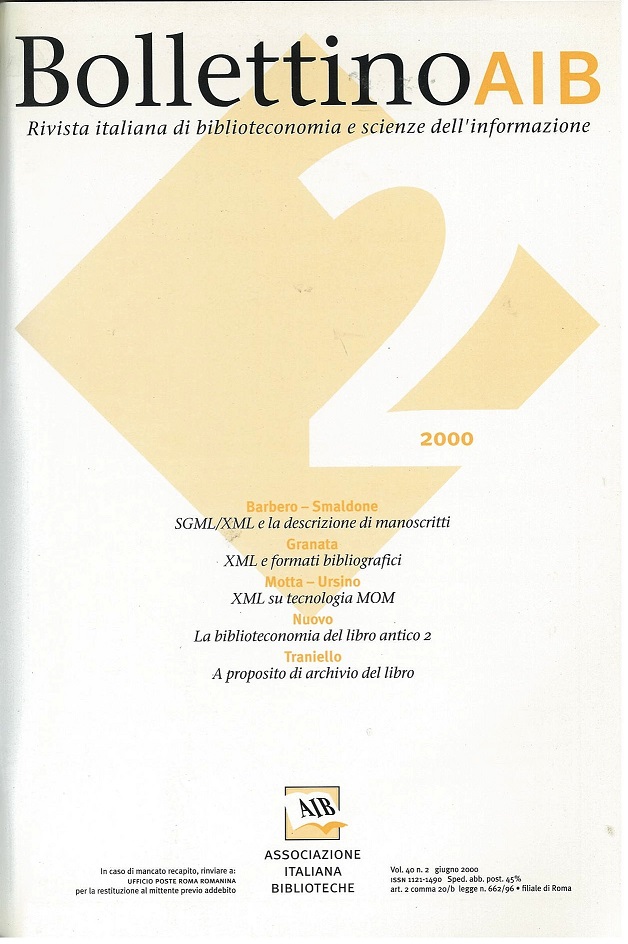Professional ethics, acquisitions and access policies in American rare book librarianship
Main Article Content
Abstract
The article examines some of the main points of the professional debate of rare book librarians in America. The proposal to define a code of professional ethics in this field was already made in 1982, with the intention of finding a solution to a series of open problems, which went from the use of the resources of the institution for personal research to personal responsibility, book appraisals and correct relations with readers.
The current version of the ACRL Standards for ethical conduct for rare book, manuscript and special collections librarians (1992) indicates the principles for an ethical management of special collections and means to regulate relations between librarians and readers in a climate of maximum transparency in a sector where a certain competition can arise; to guarantee the librarian the right to carry out personal and professional research activity; to avoid any conflict of interests in relations with the antiquarian market; guarantees indiscriminate access to the public and compels the institution to set up every type of preventive structure for the physical protection of the material.
There has been extensive debate about acquisition policies, an area in which American libraries have distinguished themselves due to the abundance of their means and the concentration of their efforts, in an attempt to establish methods and criteria for collection building. It is well known that in the United States there is a sort of reluctance to buy rare books or art objects directly with public funds: the collections are fundamentally based on gifts of private citizens, who are certainly encouraged most decisively by fiscal policies.
However, during the Nineties resources were scaled down, due to a change in the whole scientific and research context, with effects that go from the deconstruction of tradition to the fragmentation of rules and to the hybridization of traditional subjects. The demographic and ethic expansion of the university populations created difficulties for a concept that in the rare book collections was believed even pedagogically self-evident, that of the "western culture". In such a state of things, it is necessary for the rare book librarian to invent new approaches to his collections, and maintain them as sources of basic interest for the new teaching and research systems: he will not just buy rare books in pursuit of new lines of interest, but he will be able to propose quite traditional works as yet unexploited research sources. Many American scholars point out how, having noticed the emergence of new study sectors that do not use any of those sources that were traditionally preserved in libraries, the academic special collections are lacking in purpose, the librarians are completely unprepared to respond to the questions of the new scholars, and the collections themselves are destined to become irrelevant in the process of humanistic research.
Another controversial subject is that of collection weeding and sale of rare books. The latter often concern duplicates, causing each time lenghty discussions on the non-existence of really identical copies in the period of manual printing; then there is the sale of material that is considered eccentric or marginal with respect to cultivated lines. Surprisingly, notwithstanding the type of material sold, it is not the financial gain that is the main drive that brings a library to such a decision, but, usually, imminent space problems. If American libraries continue to sell, they do not do so to earn, so much as to save on the costs of storing, insurance, preservation and, above all, staff.
Many rare book librarians are aware, however, that a profit in the short term can reveal itself to be a serious loss in the long term; that it would indeed be the duty of the librarian to warn the donor that, in the case where there are duplicates in his collection, they will most likely be sold; that the return into private hands of rare books and manuscripts is often a loss that cannot be remedied within the short term.
Finally, a qualifying aspect of rare book librarianship is the constantly pursued effort to conform the access of the public to this precious and protected sector of the library with access to the other information resources of the country. There should be a continuous encouragement for its public use, in harmony with preservation requirements, in the search for a point of equilibrium that guarantees a rosy future for collections the existence of which (precisely due to their low use) is often questioned even within their hosting institutions.
Article Details

This work is licensed under a Creative Commons Attribution-ShareAlike 4.0 International License.
